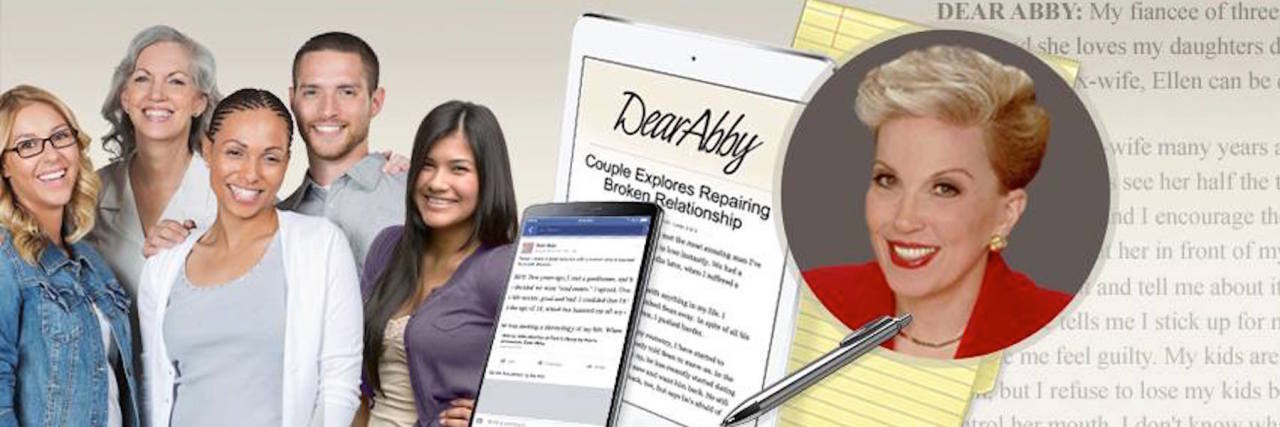'Dear Abby' Columnist Encourages Reader to Hide Suicidal Thoughts From Family
Sometimes the news isn’t as straightforward as it’s made to seem. Juliette Virzi, The Mighty’s mental health editor, explains what to keep in mind if you see this topic or similar stories in your newsfeed. This is The Mighty Takeaway.
Editor's Note
If you experience suicidal thoughts or have lost someone to suicide, the following post could be potentially triggering. You can contact the Crisis Text Line by texting “START” to 741741.
On Wednesday, popular advice column, “Dear Abby,” gave a reader “advice” that was not only problematic — it was potentially dangerous.
The reader, who goes by “DONE WITH IT,” shared that he had been living with “intense depression and grief for years,” as well as suicidal thoughts. He said he recently received a cancer diagnosis, and believed the “answer” to his mental pain was to leave the cancer untreated, and let it end his life. He was writing in to ask Abby if he should tell his family. He wrote:
I am inclined to say nothing until it’s too late, but I fear this decision will cause them as much pain as if I had died by my own hand. I don’t want to be here, and I don’t think I should have to be simply because others expect it. I don’t have a close relationship with my family anyway, if that has any bearing. We speak infrequently at best. Your thoughts, please?
It is heartbreaking to think about the pain this person is in, but the response he received from Abby might be the worst thing she could have said. Instead of encouraging this reader to reach out for help and give him hope for recovery, she did the unthinkable — she encouraged him to keep his thoughts to himself, lest he “guilt trip” his family. Here’s what she wrote:
DEAR DONE: I am sorry for your despair. You say your only question is whether to tell your family about your diagnosis because of the pain it may cause them, although you are not close and communicate infrequently. If you have truly made up your mind to refuse treatment, I vote for not informing them, which could be construed as trying to put them on a guilt trip. Everyone has a right to make this highly personal decision for themselves, but I hope you will remain in touch with your doctor, which may lessen any physical or psychological suffering you experience during the course of your disease.
If you are disgusted by this response, I’m 100 percent with you. Here are three things to keep in mind about this problematic “Dear Abby” response.
1. Telling someone about suicidal thoughts isn’t “guilt-tripping.”
I don’t care what the situation is, it’s not OK to use the phrase “guilt trip” in association with opening up about feeling suicidal. It’s not only insensitive — it’s dangerous.
People struggling with suicidal thoughts may already feel intense guilt for having thoughts of ending their lives. Even though Abby said it “could be construed” as a guilt trip (as opposed to saying it actually was a guilt trip), using that phrasing can be triggering to not just this individual writing in, but anyone who has felt the deep pain of feeling like a “burden” to their loved ones.
Hey Abby, check out a supportive example of what you could have (should have) said to your column reader. As Mighty contributor Alexa Jary said:
You may truly feel the people around you are better off without you. You may feel like an inconvenience or a burden. You are not a burden… Everyone has their own individual needs. Yours may happen to be needing a little extra emotional support when you’re depressed. You shouldn’t feel guilty for being alive. There is no one out there like you. There is no one with the same talents and interests and personality. Only you can be you. There are things in your future for you to accomplish. There are things in your future for you to stay alive for.
If you are feeling suicidal, please, please open up to someone — even if it means calling a suicide hotline. Your life matters so much.
2. Suicide isn’t ever the “answer.”
Another big problem in Abby’s response is her language, “If you have truly made up your mind to refuse treatment…” In this case, she isn’t only talking about cancer treatment, she’s also inadvertently saying, “If you have truly decided to give up on life…” presenting suicide as a “reasonable choice” someone can make.
When talking about suicide, it’s dangerous to present it as a viable option. While Abby didn’t directly encourage this reader’s passive desire for suicide, she also didn’t give him the message that suicide isn’t the answer and let him know his life is worth living.
3. When facing health challenges, people need hope.
But perhaps the biggest problem with Abby’s response is the lack of hope. Suicide is preventable and recovery is possible — but it almost always requires outside help. Encouraging this reader to isolate from his family keeps him from a potential source of help — and hope.
This isn’t just “advice” for people to consume on the internet. On the other side of the screen, there is a real person struggling with real suicidal thoughts — not to mention all the folks who will read this story and walk away feeling hopeless as well.
Dear Abby, you must do better in supporting folks who write to you about suicide. As an authority in the advice space, it could be a matter of life and death.
Header Image via Dear Abby Facebook page

